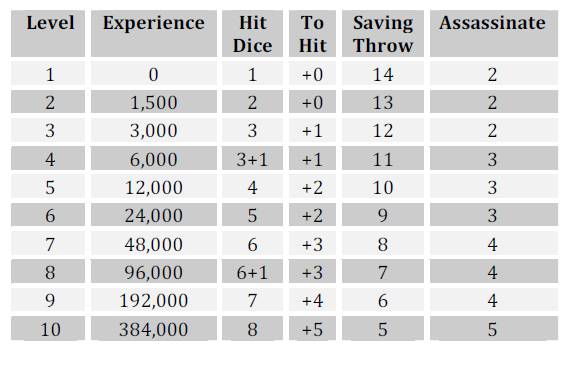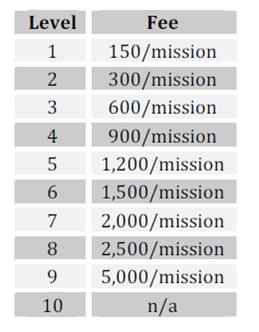THE ASSASSIN
Assassins are paid killers with skills of subterfuge and murder. They excel at disguise and the use of poison and can receive large payments for their services.
Assassins can advance to 10th level. They can use any magic items usable by Thieves. Assassins are usually Human but at the Referee’s discretion Half-Orcs may also be Assassins. Assassins are usually Chaotic but some may be of Neutral alignment. Their profession means they cannot be Lawful in most societies.
Assassins can advance to 10th level. They can use any magic items usable by Thieves. Assassins are usually Human but at the Referee’s discretion Half-Orcs may also be Assassins. Assassins are usually Chaotic but some may be of Neutral alignment. Their profession means they cannot be Lawful in most societies.
Armour & Weapon Restrictions
Assassins may use any weapons but are limited to leather armour; they may carry shields. They can use all magic items usable by Thieves.
Backstab
Assassins can backstab an opponent who is unaware of their presence (usually because of surprise), receiving +2 on their roll to hit. The Assassin is even more deadly at backstabbing than the Thief, rolling the damage die three times on a successful hit.
Assassination
Assassins can carry out assassination plots to murder their target. The player needs to describe the plot and roll 1d6: the range of success is given for the Assassin’s skill at this.
On a successful roll, the plot works as planned. The victim still needs to fail a saving throw vs Poison or Traps to be killed.
If used in combat, Assassinate enables the Assassin to position herself for a Backstab.
The Assassinate ability may only be used on a target once. If the target survives, the Assassin cannot use Assassinate on them again until he has advanced a level.
The Assassinate ability can also be used to detect a trap or remove a trap. Traps created by Assassins can do one of the following if the Assassinate roll is successful when they are triggered: deal 1d6 damage, make the target save vs Poison or die or cause the target to be captured for 1d6 rounds.
Assassins get paid for successful missions and may gain XP equal to the fee instead of the level/Hit Dice of the target. However, they are expected to give half the gold they earn to their Guild.
On a successful roll, the plot works as planned. The victim still needs to fail a saving throw vs Poison or Traps to be killed.
If used in combat, Assassinate enables the Assassin to position herself for a Backstab.
The Assassinate ability may only be used on a target once. If the target survives, the Assassin cannot use Assassinate on them again until he has advanced a level.
The Assassinate ability can also be used to detect a trap or remove a trap. Traps created by Assassins can do one of the following if the Assassinate roll is successful when they are triggered: deal 1d6 damage, make the target save vs Poison or die or cause the target to be captured for 1d6 rounds.
Assassins get paid for successful missions and may gain XP equal to the fee instead of the level/Hit Dice of the target. However, they are expected to give half the gold they earn to their Guild.
At 9th and 10th level, the Master Assassin will usually send lesser Assassins on missions and collect half their fees.
Poison
Assassins can acquire and use Poison. A dose of Poison costs 50gp.
Poison can be put in food or drink or applied to a sharp weapon (including arrows and quarrels). If a target takes any damage from a poisoned weapon, they must save vs Poison or die. The Poison is removed from the weapon, whether the target dies or not.
Undead, golems, demons and fey creatures are not vulnerable to Poison.
Poison can be put in food or drink or applied to a sharp weapon (including arrows and quarrels). If a target takes any damage from a poisoned weapon, they must save vs Poison or die. The Poison is removed from the weapon, whether the target dies or not.
Undead, golems, demons and fey creatures are not vulnerable to Poison.
Saving Throws
Assassins gain a +2 bonus against Poison and Traps.
Establish Guild
At ninth level, an Assassin may build a secret hideout in a town or city. She becomes a Master Assassin and attracts the services of a band of lower level assassins who learn from her and pay her some of their earnings in return for protection from the law.
Trauma
Assassins are brutal people and do not gain Trauma from seeing companions die or searching bodies.
The use of Poison is deplored in civilised company. Every time the Assassin uses Poison, any adventuring companions gain a Trauma point.
The Assassin may try to use Poison secretly: the Assassination skill can also be used to prevent companions from gaining Trauma when Poison is used (this is a separate roll from the roll to assassinate a target).
The use of Poison is deplored in civilised company. Every time the Assassin uses Poison, any adventuring companions gain a Trauma point.
The Assassin may try to use Poison secretly: the Assassination skill can also be used to prevent companions from gaining Trauma when Poison is used (this is a separate roll from the roll to assassinate a target).
Assassin Feats
At 3rd, 5th, 7th and 9th level, Assassins may choose from these Feats:
Apothecary: You can concoct your own Poisons and start each game with 1d6 ready. You Poisons can paralyse for a Turn or kill over 1d6 days rather than killing immediately. You can make antidotes to your own Poisons.
Deadly Traps: Your Traps deal a number of six-sided dice in damage equal to your Assassinate score.
Master of Disguise: You can spend 1d6 rounds disguising yourself to appear as any class, gender or race of your approximate build. If onlookers try to see through your disguise, use your Assassinate skill to fool them.
Sniper: You gain your Backstab bonus when striking unseen in missile combat; you can assassinate using missiles.
Strangler: You can use your Assassinate ability to kill with your bare hands. If you succeed in your plot, you can roll to hit at +2 and instead of doing damage, you can throttle the target to death but this takes 1d6 rounds, during which time they are helpless to attack or cast spells.
Toxin Resistance: You dose yourself with Poison to build up a resistance and re-roll failed saving throws, taking the best result.
Apothecary: You can concoct your own Poisons and start each game with 1d6 ready. You Poisons can paralyse for a Turn or kill over 1d6 days rather than killing immediately. You can make antidotes to your own Poisons.
Deadly Traps: Your Traps deal a number of six-sided dice in damage equal to your Assassinate score.
Master of Disguise: You can spend 1d6 rounds disguising yourself to appear as any class, gender or race of your approximate build. If onlookers try to see through your disguise, use your Assassinate skill to fool them.
Sniper: You gain your Backstab bonus when striking unseen in missile combat; you can assassinate using missiles.
Strangler: You can use your Assassinate ability to kill with your bare hands. If you succeed in your plot, you can roll to hit at +2 and instead of doing damage, you can throttle the target to death but this takes 1d6 rounds, during which time they are helpless to attack or cast spells.
Toxin Resistance: You dose yourself with Poison to build up a resistance and re-roll failed saving throws, taking the best result.
Half-Orc Cleric-Assassins
Half-Orcs can advance as multi-classed Cleric-Assassins in the same way as Elves combine Fighter and Magic User. A Cleric-Assassin can wear Leather or Chain Armour, carry a Shield, wield any weapon, perform Backstabs with melee weapons, use Poison and carry out assassinations as well as using Clerical spells and turning/commanding Undead. Cleric-Assassins receive saving throw bonuses against Poison, Paralysis and Traps. They are limited to 6th level.
When creating a Cleric-Assassin, the character receives the God's Weapon ability of Clerics as well as the Poison ability of Assassins. They may choose Feats from the Clerical or Assassin lists.
When creating a Cleric-Assassin, the character receives the God's Weapon ability of Clerics as well as the Poison ability of Assassins. They may choose Feats from the Clerical or Assassin lists.
Referee Advice
You have to rule on assassinations on a case-by-case basis.
The Assassination skill does not kill a target. It can be used to put Poison in someone’s food or drink successfully (but they still get a Save vs Poison) or create a Trap that the target will walk into (but they might survive the damage, make their Saving Throw or escape). In melee combat, it enables the Assassin to attempt to Backstab (but they must still roll to hit and roll damage normally).
Targets with magical defences (e.g. wearing a Medallion of ESP) might be immune to assassination attempts.
Poison is expensive for low-level Assassins and is illegal in most towns and cities. The Referee can rule that it is not available for purchase or ask the Assassin to succeed in an Assassination roll in order to source Poison for sale.
Other adventurers gain Trauma when Assassins use Poison even if they themselves use poisons on occasion. Other adventurers do not have the skill to use poisoned weapons safely. If another adventurer tries to use a weapon that an Assassin has poisoned, they gain 1 Trauma for doing so and also must save vs Poison themselves every round that they use it. This also applies if non-Assassins try to handle an Assassin’s Poison for other uses.
Blade Venom (for example, as used by Swamp Elves) is different from Poison, in that it deals extra damage rather than killing outright. It does not cause Trauma.
The Assassination skill does not kill a target. It can be used to put Poison in someone’s food or drink successfully (but they still get a Save vs Poison) or create a Trap that the target will walk into (but they might survive the damage, make their Saving Throw or escape). In melee combat, it enables the Assassin to attempt to Backstab (but they must still roll to hit and roll damage normally).
Targets with magical defences (e.g. wearing a Medallion of ESP) might be immune to assassination attempts.
Poison is expensive for low-level Assassins and is illegal in most towns and cities. The Referee can rule that it is not available for purchase or ask the Assassin to succeed in an Assassination roll in order to source Poison for sale.
Other adventurers gain Trauma when Assassins use Poison even if they themselves use poisons on occasion. Other adventurers do not have the skill to use poisoned weapons safely. If another adventurer tries to use a weapon that an Assassin has poisoned, they gain 1 Trauma for doing so and also must save vs Poison themselves every round that they use it. This also applies if non-Assassins try to handle an Assassin’s Poison for other uses.
Blade Venom (for example, as used by Swamp Elves) is different from Poison, in that it deals extra damage rather than killing outright. It does not cause Trauma.




